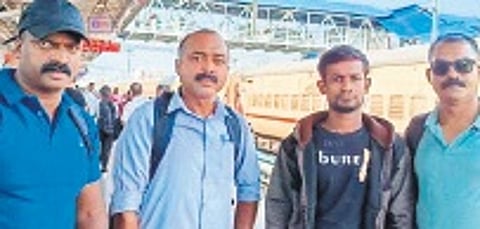

KOCHI: A few days ago, on a foggy evening along the treacherous banks of the Padma River, where the India-Bangladesh border dissolves into uncertainty, a Kerala police team ‘crashed’ in on their elusive target in filmy style.
For over five years, Shahin Akhter Molla, accused of a brutal murder in Kochi, had evaded justice. This time, there would be no escape.
As Shahin vroomed on a motorcycle towards the riverbank, his plan was apparent to the officers — abandon the bike, dive into the icy waters, and disappear across the international border. They were in no mood to let him escape. Officers rammed their two-wheeler into his motorcycle, sending him crashing to the ground.
The dramatic end to the chase was the culmination of years of frustration, meticulous planning, and an unrelenting pursuit that took the officers over 2,000km to the border zone.
A quick flashback to 2019 in Fort Kochi, where it all started. Shahin, 38, had migrated from Jalangi, West Bengal, in 2018 to work in Kerala. He worked as a daily wager under a construction contractor and shared a rented house in Mattancherry with 58-year-old Mani, a native of Vattiyoorkavu in Thiruvananthapuram.
The two, who worked together at construction sites, quickly became thick friends. However, trouble began when Shahin lost his mobile phone and started borrowing Mani’s phone to contact his relatives. Alleging misuse, Mani confronted Shahin, leading to a heated altercation. On March 18, 2019, an inebriated Shahin assaulted Mani, leaving him unconscious in their rented house.
Other workers staying nearby rushed Mani to the hospital, but he succumbed to spinal injuries. The postmortem report confirmed homicide.
“Shahin was arrested and remanded to judicial custody,” recalls an officer who was part of the probe. “However, he was granted bail after a few months and then went into hiding. Despite multiple attempts to trace him, including two visits to his village, Shahin remained elusive.”
This year, the case gained renewed focus when IPS officer P B Kiran assumed charge as assistant commissioner in Mattancherry. He teamed up with Inspector M S Faisal, newly posted as station house officer in Fort Kochi, to track down absconders linked to crimes in the region. That’s when the Mani murder case cropped up again.
They formed a team comprising ASI Augustin Rockey, Senior CPOs K C Mahesh and N S G Kumar to track Shahin. “Our initial efforts to trace his SIM card failed,” says the officer.
“Later, we searched for Shahin’s criminal history and discovered that he had been arrested a few months ago by West Bengal police for assaulting his wife in Murshidabad. This confirmed that he was in the area.”
In late November, a probe team was dispatched to Murshidabad. “We only had his address and a photograph. We visited his house in Jalangi, on the banks of the Padma River. His wife provided a phone number, but it belonged to someone else. Shahin, fearing arrest, never used a mobile phone,” the officer adds.
The team roamed the villages of Murshidabad on motorcycles, assisted by two local officers from Jalangi police station. They learnt that Shahin frequented a liquor shop and contacted his family using the phones of other customers.
After hours of surveillance, Shahin arrived at the shop with friends. “He sensed our presence and fled on his motorcycle. We chased him to the riverbank. We had a gut feeling that he planned to swim across the river into Bangladesh,” says the officer.
“One of our officers rammed his motorcycle into Shahin’s bike from behind, causing him to fall. We swiftly nabbed him and took him to Jalangi police station.”
Shahin, who was transported to Kochi by train, has been remanded to judicial custody. “We spent 13 days in West Bengal. It was indeed quite a unique, thrilling experience,” the officer says.